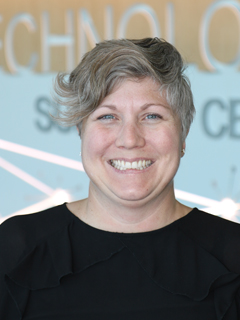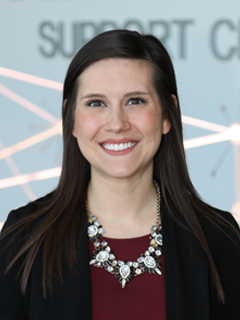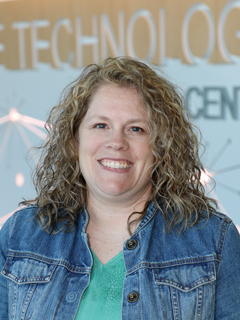- Olathe Public Schools
- 2024 News Articles
- 2019 News Articles
News & Information
Page Navigation
12-13-19 — District Nominates Trio for State-Level Awards
Dec. 13, 2019 ~ A kindergarten teacher, an English language arts teacher, and an Advanced Placement literature teacher will represent Olathe Public Schools in statewide teaching award programs. A district selection committee reviewed classroom video and interviews with nine candidates for three state-level awards: 2020 Kansas Teacher of the Year Award (elementary and secondary categories) and 2020 Emporia State University Master Teacher Award.
“We are proud of Kimberly Davis and Jessica Skoglund for being named finalists for the Kansas Teacher of the Year program as well as Mardy Ortman who was chosen as Olathe's ESU Master Teacher finalist,” said Olathe NEA President Kathy Meyer. “Olathe has so many quality teachers that it is an honor to have Kim, Jessica and Mardy chosen to represent Olathe Public Schools. They each go above and beyond in teaching every student, every day in fun, authentic ways to prepare them for their future. Congratulations to each of these fine teachers.”
The following are excerpts from interview questions in the semifinalist stage of the district’s nomination process.
Kimberly Davis, kindergarten teacher at Ravenwood Elementary School, Kansas Teacher of the Year (elementary) nominee
What prompted you to go into education?
I wanted to be a teacher from about the time I was 5. My mom was a teacher and my grandfather was a teacher. Almost every adult in my family was a teacher, so it seemed like the thing to do.
 What would you consider your greatest accomplishment in education?
What would you consider your greatest accomplishment in education?
It’s when my students come back to me. I have students who have gone on to college and come back to see me and talk to me about their time in our class and how important it was and how I made a difference in their life. That tells me I’ve made an impact in their life and that’s a really big accomplishment for me.
Describe how your beliefs about teaching are demonstrated in your personal teaching style.
I think everyone can learn. I think everyone has their good days and bad days, but every day is a new, fresh start. We’re always very positive in kindergarten. We’re always honest and forthcoming, and always working on how to be better people. I like to show the kids it’s OK to make mistakes and that’s how we all learn.
If you could give advice to a new educator, what would it be?
Make sure you find balance. There’s always going to be something you can do at school. Have a hobby, spend time with your family. School will always be there. Keep your life in balance.
What are the biggest obstacles facing public education today?
One of the biggest challenges today is bringing new educators into the profession. I think we need to do a good job of recruiting, training and supporting new educators so we can continue to have a very strong education system.
Jessica Skoglund, English language arts teacher at Olathe Northwest High School, Kansas Teacher of the Year (secondary) nominee
What prompted you to go into education?
I was one of those people who knew they wanted to be a teacher from the very beginning. I would line up stuffed animals and teach them. When it became real was when I got leadership opportunities in high school that allowed me to help other people. Those experiences really allowed me to see the value in helping other people and the value of education. I just always loved interacting with other people and believing I could make a difference in their lives.
 What would you consider your greatest accomplishment in education?
What would you consider your greatest accomplishment in education?
My greatest accomplishment has been developing real-world learning for my students. In my classroom’s mini-documentary project, students are able to practice their argumentation and persuasive skills not just in the classroom, but in a public exhibition night. To me, any time I can enhance real-world learning I think that’s going to transfer outside of the classroom. It’s not going to get better than that.
Describe how your beliefs about teaching are demonstrated in your personal teaching style.
I have a culture of high expectations and excellence in my classroom and my coaching. Research shows people are going to rise to the expectations you set. I offer my students support to get there, but I think those high expectations are driven from the beginning. I also have beliefs about learning being real world. Several years ago, our students were learning about argumentation and rhetoric so we had them watch the presidential debates in 2016. I believe in the importance of “soft skills:” communication, collaboration, time management.
If you could give advice to a new educator, what would it be?
Amplify not only your own voice, but other’s voices. This is something I feel passionate about. At the classroom level, it starts with amplifying the student’s voice. At the building level, make your voice heard. This extends up to the district level. If you have opinions or ideas, in Olathe those are always welcome. As the ONEA high school representative, we’re fortunate that we’ve almost always been able to meet with district administrators or building administrators and work together.
What are the biggest obstacles facing public education today?
We can all work to bring everybody to the table to have a conversation and make sure that all stakeholders’ voices are heard. I think it’s really important that we are willing to listen to everybody and hear their voice. At the building level, I think a lot of teachers would say their voice doesn’t matter. I would want to overcome that obstacle and let them know their voice can be heard.
Mardy Ortman, AP literature and AVID teacher at Olathe West High School, Emporia State University Master Teacher nominee
What prompted you to go into education?
My parents are both educators. They spent over 30 years as teachers, administrators, and coaches. I grew up around educators. As I got into college and had some great professors who fostered the love of teaching and passing on knowledge. It was probably about then that I knew I could take something I loved, like literature, and hopefully pass that love on to the next generation of students. That’s what prompted me to go into education.
 What would you consider your greatest accomplishment in education?
What would you consider your greatest accomplishment in education?
As far as recent accomplishments, it was starting a brand new school from the ground up, working alongside our administration to put together a department of teachers who are dedicated to working together to really make Olathe West the best school we possibly can. I think that is my greatest accomplishment.
Describe how your beliefs about teaching are demonstrated in your personal teaching style.
I think education is really about engaging and empowering our students. My teaching style is to have my students engaged every day in what they’re learning. I want to empower them to reach the goals they set for themselves. Forming relationships with my students is an integral part of my teaching process. I want students to feel empowered to engage in any and all activities, and I hope they enjoy being in my classroom.
If you could give advice to a new educator, what would it be?
I have mentored two brand new educators the past two years. My first piece of advice is to dig in with your colleagues and ask as many questions as you can. Don’t be afraid to ask questions or to fail. Take a step outside your comfort zone. I always tell new teachers we’re here to help one another and it’s OK to take risks because that’s when the best teaching happens.
What are the biggest obstacles facing public education today?
Two of the biggest obstacles: We have some people in positions of power who maybe haven’t ever been in education. They’re so far removed from what we do every day and yet they’re making decisions about our careers, students, and learning. I feel like we need to get more teachers in positions of leadership beyond just at the community level, but at the state level and in our nation as well. Another challenge we’re trying to meet is that we have no idea what the job market is going to look like for our students. The jobs are morphing into all sorts of things that we have to prepare our students for whatever is coming, even though we have no idea what it is.

